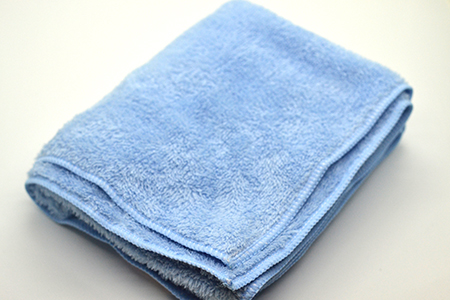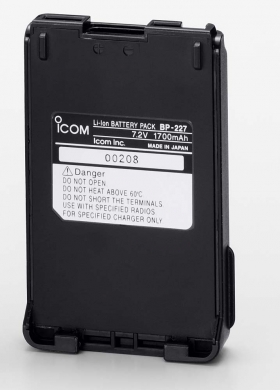Caution and care
Precautions for the use and storage of your batteries
The batteries supplied by ICOM are the guarantee for batteries whose condition is regularly checked from manufacture to sales!
What are the safety requirements for handling and storing batteries?
For your safety and in order to ensure optimal use of your batteries and limit the loss of capacity over the years, here are some important tips for handle, care and storage for your batteries:
- Only use the specific charger supplied with your battery.
- Strictly observe the charging conditions: after intensive use, as the battery temperature rises, do not recharge your battery immediately and for the same reason do not use your device immediately after recharging.
- Strictly observe the discharge conditions: avoid large discharges (until the device is switched off).
- Check the charge of stored batteries, little or not used: for long storage periods (several weeks to a few months), it is preferable not to fully charge the battery but to leave it half charged and to do partial recharges every month to reactivate the electrolyte and the electrodes and compensate for self-discharge equivalent to 5 to 10% per month.
- Regularly check the condition of your ATEX, FM and UL batteries, which discharge faster than others.
- As a precaution, replace your batteries every 5 years. Even if their charge capacity still seems sufficient. The components inside the batteries deteriorate over time, even for batteries used infrequently.
- Prevent batteriers from overheating: store the batteries in a dark container and away from light, sunlight or any heat source. The recommended storage temperature is between 16 and 22°C. A ventilated place prevents any buildup of dangerous and flammable toxic gases.
Be careful and avoid hazards associated with batteries!
- Do not use a battery that is damaged (impacts, deformation, corrosion, leakage, discoloration or abnormal smell...)
- Do not attempt to repair a battery: do not open, puncture or weld it
- Do not immerse the battery in any liquid (water, sea water...)
- Do not throw out old batteries that are toxic to the environment: recycle used batteries in battery drop-off container
Safety precautions for Lithium-ion batteries?
Here are a few important instructions for a safe handling and storage of your lithium-ion batteries!
- The lithium-ion battery contains metals and flammable products such as organic solvents. Improper care or storage in inappropriate locations can cause serious damage (release of toxic gases or smoke, fire or explosion) and battery performance can be seriously damaged.
- Ensure that your Li-Ion batteries are charged regularly:
- Even when not in use, Li-Ion batteries require regular charging to optimize their performance over time.
- Li-Ion batteries are not suitable for long periods of discharge.
Recommended charging frequency
- Li-Ion batteries: at least once a year.
- ATEX or IECEx Li-Ion batteries (BP-277EX, BP-277AX, ...): every six months.s that are toxic to the environment: recycle used batteries in battery drop-off container.
Recommended Cleaning Guidelines for Icom Radios and Accessories
In response to the coronavirus (COVID-19) pandemic, Icom is providing recommended cleaning guidelines for Icom radios and accessories.
Indeed, to limit the risks of spreading bacteria and viruses, it is essential to clean your equipment (handheld, LTE radio, mobile radio, headset or earphones, etc.) in an appropriate manner.
Find out how to properly clean your radio equipment in 4 simple and easy steps. And also follow the basic precautions to keep your equipment in perfect working order.
Of course, be sure to wash your hands thoroughly before and after using your radio equipment.

How to properly clean your equipment in 4 steps?
Step 1 :
First of all, before cleaning your equipment, turn off your radio to avoid heat production and any risk of malfunction.
Step 2 :
Then use a clean, dry, soft cloth lightly moistened with alcohol. Isopropyl alcohol (also known as isopropanol) at a concentration of 70-80% is preferred. You can also find it in the form of soaked wipes.
Step 3 :
Gently wipe the surfaces of your radio. At the openings (audio output, connector, buttons, keys...), be sure to wipe them carefully.
Step 4 :
Finally, make sure your batteries are dry enough before use or charging.
Safety precautions while cleaning
Here are some warning points to follow to clean your equipment safely:
- Be careful: do not apply or spray the alcohol solution directly on the unit, or soak it in the solution.
- Avoid wiping the antenna or display as much as possible, as rubbing alcohol can damage the resin parts.
- Do not use bleach, ammonia-based products, detergents, or organic solvents (thinner, benzine, etc.) even when diluted. These products could damage the operation or deteriorate your equipment.
- Always be sure to test the alcoholic solution on a small, inconspicuous area of the product before cleaning your equipment completely.
We do not guarantee compatibility with all rubbing alcohols. Therefore, we recommend that you read the precautions for the selected rubbing alcohol carefully before use.
ICOM France and its distributors cannot be held responsible for any damage or malfunction resulting from the use of inappropriate rubbing alcohol or improper cleaning.



